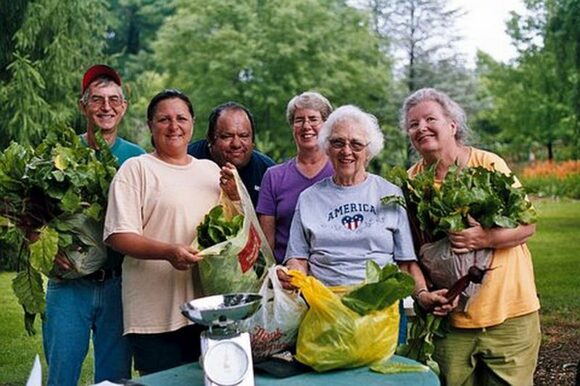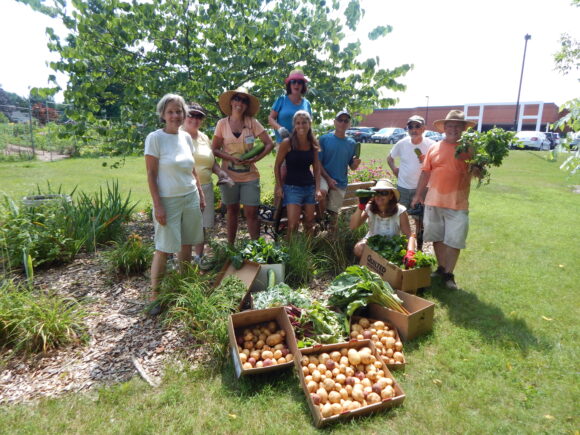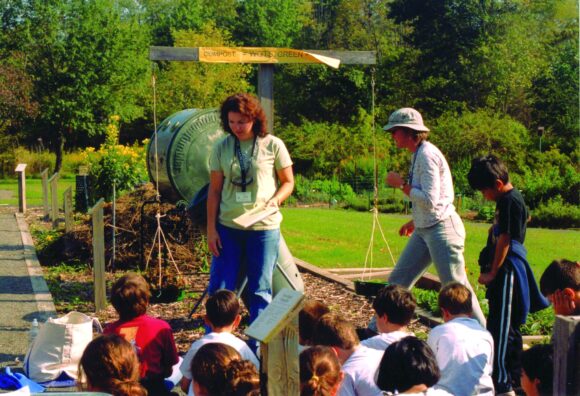
Union county Master Gardeners
By Nicholas Polanin, chair, Dept. of Agriculture and Natural Resources and Jan Zientek, senior program coordinator and former statewide Rutgers Master Gardener coordinator.
The dozen or so seed catalogs that I’ve received in the mail and the seeds and seed starting kits appearing in my local hardware store are a reminder that gardening season is upon us. Historically, this is the time of year when Rutgers Master Gardeners (RMGs) start to conduct gardening workshops, explain the importance of soil tests to home gardeners, and identify those insects people find crawling inside their homes. Rutgers Master Gardeners are trained volunteers who assist Rutgers Cooperative Extension in its mission to deliver horticulture programs and information to the public.

Rutgers Master Gardeners at Giving Garden Harvest,
Monmouth County.
Despite the obvious challenges, these past few years saw the program expand and improve. Community gardens in North Jersey benefited from the Morris County RMG’s Community Garden IPM bulletins, which received the national “Award for Excellence” in 2021 from the National Master Gardener Association. And RMGs across the state participated in a tomato pruning experiment to study the impact of pruning tomato plants during fruit production, efforts that produced both data and fruit (donated to food banks). We also gained experience with hosting online gardening classes for the public as well as training new Rutgers Master Gardener volunteers, thereby making the Rutgers Master Gardener training more accessible to New Jersey residents.
Every spring, many people in New Jersey buy seeds for the first time. After having gained gardening experience with seedlings they purchased and starting their first flower or vegetable garden, they now want to “grow their own” from seed. This builds on a surge of interest in home gardening that has been observed nationally during the COVID pandemic. Anecdotal stories from Rutgers Cooperative Extension county offices on increased inquiries for gardening information bear this out. Since 1984, Rutgers Master Gardeners have been teaching gardening techniques and answering the questions of new and experienced gardeners in New Jersey. In addition to their numerous traditional teaching and outreach activities, RMGs have found new and creative ways to continue to serve their communities.
Some county programs have launched Helpline Zoom sessions, creating virtual communities where people could ask questions, exchange ideas, and hear what other people were doing to manage insects, diseases, and other challenges to their landscape. Lunch break online gardening talks were joined by people from across New Jersey and even throughout the nation. Dozens of dedicated volunteers in each county RMG program took on the new role of ‘IT Professional’ to make it possible to continue Rutgers Cooperative Extension’s education and outreach mission Importantly, online programs are allowing RMGs to maintain a connection with underserved or isolated residents of our state in senior residences, rehabilitation centers, and vocational programs.

Master Gardeners Teaching Composting in Mercer County.
While online programs have allowed them to remain engaged with their communities, RMGs always prefer to get their hands dirty in the real world, and gardening is generally an outdoor activity. RMG programs are now coming out of winter dormancy to work in community and school gardens, demonstration gardens, public parks, and environmental education sites. RMGs will once again offer vegetable gardening demonstrations to avid or novice gardeners attempting to grow their first “Jersey tomato,” or how to identify the insects eating these prized azaleas.
As work at county parks, school gardens, and environmental education centers will resume this spring, RMG trained volunteers will continue to look for opportunities to become more involved. For example, in Essex County, RMGs were joined by neighborhood volunteers to maintain the Brookdale Park Rose Garden. With more people turning to RMGs to ask about how to join or start community gardens, our teaching and demonstration gardens are expected to, once again, produce thousands of pounds of fresh fruits and vegetables to be donated to community food banks in New Jersey.
We don’t know what challenges to expect in 2023, but RMGs will most assuredly meet them head on. While we have all been preoccupied by new and unexpected challenges, the Spotted Lantern Fly has become a significant nuisance and agricultural threat across the state. The variability of our weather can cause problems for new and experienced gardeners alike; or another insect or invasive plant will threaten our gardens, landscapes, or forests. The Rutgers Master Gardeners will continue to learn, adapt, and provide science-based solutions to the public. I invite you to contact your local Rutgers Cooperative Extension office and inquire about training to become a Rutgers Master Gardener volunteer. Information is available at The Master Gardeners website.

